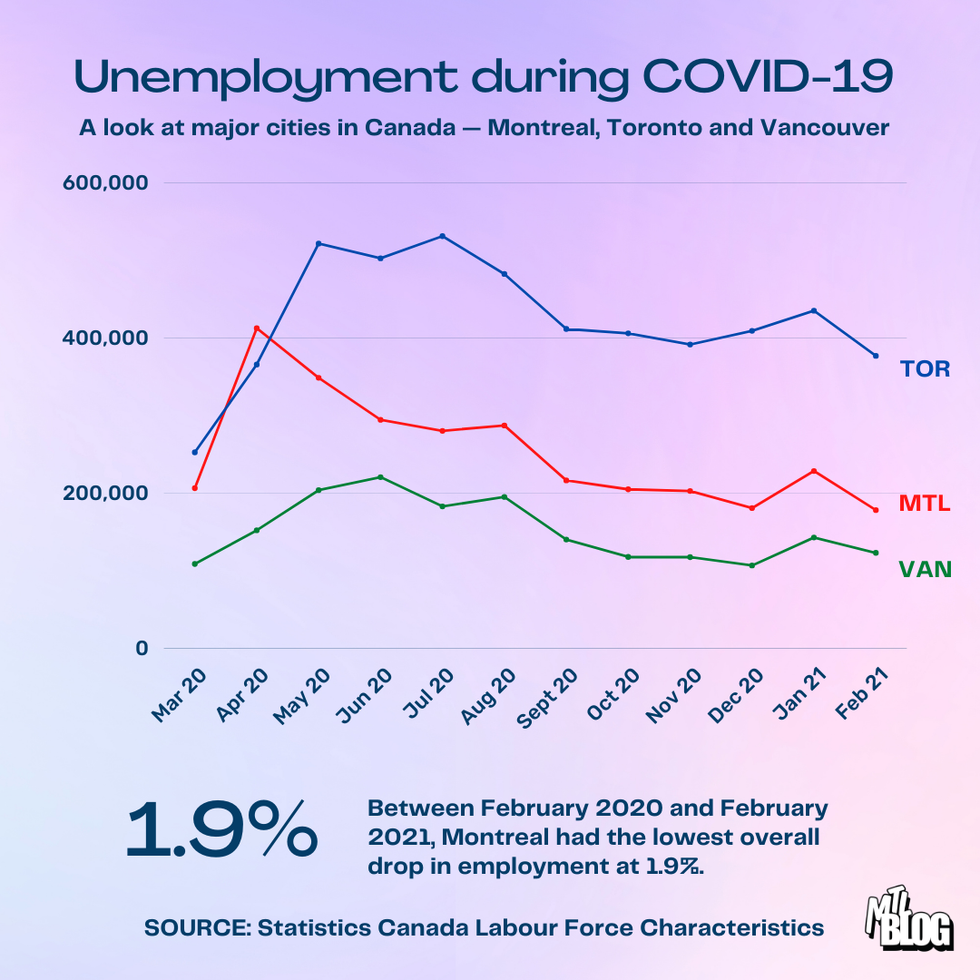Canada's LGBTQ2S+ Community Is Now '1 Million Strong' But Still Faces Big Systemic Issues
Data from Statistics Canada on the country's queer community revealed that as of 2018, there were approximately one million LGBTQ2S+ people in Canada.
Canada's statistical agency released the data on June 16 to create a "portrait" of the "demographic and social profile of Canada's diverse LGBTQ2+ communities" — however, much of the data "[focuses] on LGB Canadians (lesbian, gay, bisexual), since Statistics Canada has been collecting detailed information on these communities since 2003."
Editor's Choice: What You Need To Know About The New Bill To Make French & English More Equal In Canada
More young people identify as LGBTQ2+
In 2018, 30% of Canada's LGBTQIA2S+ population consisted of people between the ages of 15 and 24.
The same age group made up only "14% of the non-LGBTQ2+ population."
"At the other end of the spectrum," said Statistics Canada, "7% of LGBTQ2+ Canadians were aged 65 or older, compared with 21% of non-LGBTQ2+ Canadians."
"Approximately 75,000 Canadians identified as trans or non-binary" in 2018, "representing 0.24% of the Canadian population aged 15 and older," according to StatsCan's 2018 Survey on Safety in Public and Private Spaces.
There were 72,880 same-sex couples in Canada in 2016, making up 0.9% of all couples in Canada.
StatsCan said half of those same-sex couples lived in the major cities of Toronto, Montreal, Vancouver and Ottawa–Gatineau.
Between 2006 and 2016, the number of same-sex couples in Canada increased by 60.7%, compared to an increase of 9.6% in "opposite-sex" couples.
StatsCan said the increase "may be reflective, at least in part, of growing awareness and acceptance of sexual diversity in Canada."
LGBTQ2S+ hate crimes are on the rise in Canada
According to StatsCan's 2018 survey, LGB+ Canadians were both more likely to report being "violently victimized" throughout their lives and more likely to have experienced "inappropriate behaviours in public and online" than non-queer Canadians.
In 2018, LGB+ Canadians were "twice as likely" as non-queer Canadians "to report experiencing inappropriate behaviours" in the 12 months prior to the survey:
in public: 57% versus 22% of non-queer Canadians
online: 37% versus 15% of non-queer Canadians
at work: 44% versus 22% of non-queer Canadians.
Violent hate crimes against LGB+ Canadians were on par with violent racially-charged hate crimes in 2018.
Of hate crimes that targeted sexual orientation, 53% were violent crimes.
In comparison, 27% of hate crimes targeting religion and 52% of hate crimes targeting race or ethnicity were violent crimes, according to the data.
Further, according to StatsCan's 2018 survey, transgender Canadians were also more likely to report poorer mental health than cisgender Canadians.
They were also more likely to have "seriously contemplated suicide in their lifetimes."
Transgender Canadians were additionally more likely "to have been diagnosed with a mood or anxiety disorder" than cisgender Canadians.
The pandemic might have had a bigger effect on LGBTQ2S+ Canadians
StatsCan said that the LGBTQ2S+ population could have been "disproportionately affected" by job loss during the pandemic since a greater share of the communities' populations are between the ages of 15 and 24 — an age group whose employment levels "remains furthest from February 2020 levels."
LGBTQ2S+ Canadians also made less than their non-queer counterparts overall.
In 2018, 41% of LGBTQ2S+ Canadians "had a total personal income of less than $20,000" yearly, compared to 26% of non-queer Canadians.
In the same year, on average, queer income-earners in Canada made about 72% — $39,000 — of the average income of non-queer Canadians, at $54,000.
However, StatsCan noted that the income difference could partly be due to the large youth population in LGBTQ2S+ communities. Being enrolled in high school, CEGEPs or universities could reduce their potential income, the agency said.
In 2018, 33% of LGBTQ2S+ Canadians "found it difficult or very difficult to meet their needs in terms of transportation, housing, food, clothing, participation in some social activities and other necessary expenses," compared with just 27% of non-queer Canadians, according to StatsCan.





 Jet P.
Jet P. Jet P. Jet P.
Jet P. Jet P.
People Are Accusing The SPVM Of Deleting Insta Comments About Fining The Homeless
The Service de police de la Ville de Montreal (SPVM) caused a stir on social media on January 13, when at least three people accused the SPVM Instagram account of deleting comments questioning its treatment of Montreal's homeless population.
Beneath a photo of an SPVM officer with one of the police force's horses, Montrealer Sabrina Prosser pressed the SPVM on why a homeless Montrealer was reportedly issued a $1,550 ticket for breaking Quebec's COVID-19 curfew rules.
Editor's Choice: Legault Responded To Criticism Of Policing Homeless Quebecers During Curfew
“
How dare they try to silence a genuine and non-aggressive question?
Sabrina Prosser
Prosser told MTL Blog she wanted to know what the SPVM was doing to rectify the situation with the city's homeless population during curfew hours.
But she said that a few minutes after posting, her comment was removed.
Prosser then posted a second comment, she said, and encouraged her friends and followers to continue asking the SPVM for details regarding the $1,550 ticket.
Prosser said her follow-up comment, as well as an additional third comment, were also deleted.
Two more commenters, Juliana Dehm and Victoria Rodriguez-Carnevale, told MTL Blog the SPVM deleted their initial comments.
Unlike in Prosser's case, Dehm claimed the SPVM did not intervene in a follow-up comment she posted.
"I guess they realized everyone was spreading the word about what they were doing," she said.
A spokesperson for the SPVM told MTL Blog that its moderators are sometimes required to remove comments on its social media platforms — specifically, when they are off-topic or have been uploaded several times, as per its 'Netiquette' policy.
"The specialized teams of the SPVM [...] work for the well-being of vulnerable people, including those who find themselves in a situation of homelessness, at the time of enforcing curfew measures," the spokesperson said.
"Where possible, the police will also accompany people experiencing homelessness to the appropriate resources so that they can receive the help and support they need."
Prosser said the SPVM's actions contradict its "Netiquette" policy, as her first comment was just posted once and was respectful.
"They are effectively trying to sweep it under the rug, and as a taxpaying citizen, I have an absolute right to question whether or not the SPVM is doing their job properly," she said.
Other Montrealers joined the discussion, asking the SPVM to justify its actions of deleting Prosser's initial comment.
The SPVM — issuing a response in the comments section five days after Prosser began to question its social media management — referred another commenter, Tiger Tchakounté, to its 'Netiquette' policy.
Dehm called the SPVM's response an "excuse," saying that Prosser's initial comments were "neither rude nor vulgar."
Prosser told MTL Blog that she believes the SPVM still needs to be held accountable for its treatment of the city's homeless population.
"If [the SPVM] are going to have that budget, they better be open to criticism and guidance," she said.
"This is not a police state. This is not okay."
As of January 22, there were numerous comments in the thread for this photo questioning the SPVM's practice of ticketing homeless people, and criticizing the SPVM for allegedly deleting comments.